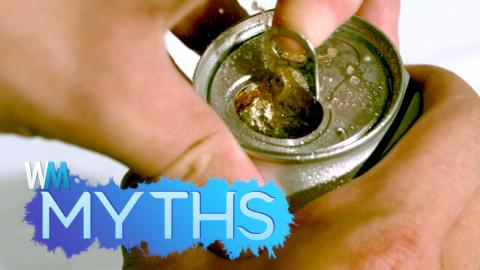Top 5 Soda Myths

It's an occasional indulgence for some, and a daily diet choice for others. Welcome to WatchMojo's Top 5 Myths, the series that finds the biggest myths people actually believe, and dispels them one by one.
For this installment, we'll be looking at the five Soda Myths that left us parched.
It doesn't matter whether you call it pop, soda or soft drink, these are the myths that continue to swirl around the world of carbonated beverages to this day.
#5: Mountain Dew lowers sperm count
Now we know you love swigging down some mountain dew when gaming, or perhaps indulging in some “Dewritos”…But this is one myth that had you breaking the habit – even for the sake of that double EXP in call of duty. But rejoice, gamers, Mountain Dew actually doesn’t lower your number of “swimmers”.
There's actually no research linking infertility to the popular green beverage, despite what people tell you about the combination of caffeine and the Yellow No. 5 food coloring, which gives the drink its absurd color.
This dye, also known as Tartrazine, is also found in such other popular foods as Kraft Macaroni and Cheese, but is passed through our bodies largely through urine, with very little of it metabolized in the body.
Sure the FDA sent out a warning that too much of it can be detrimental to your health, but it's likely impossible to drink enough Mountain Dew to assert any sort of negative effects upon a man's sperm count.
#4: Carbonation causes brittle bones
The next tall-tale on our list is one that has long followed the soft drink industry, and is more likely a case of mistaken identity.
The idea that carbonated drinks causes brittle bones isn't so much the cause of carbonation, but rather phosphoric acid, a flavor agent which some say increases acidity in the blood.
The body then apparently tries to neutralize this increased acidity by leeching out calcium from the bones to compensate.
So therein lies the problem – sure carbonation isn’t the cause of ‘brittle bones’, but this phosphoric acid is present in a lot of carbonated sodas – particularly colas. If you want to avoid this problem, you might want to stick to a glass of sparkling water to get your fix of bubbles.
#3: Ginger Ale can treat your nausea
Is your tummy-wummy hurting? Just take a swig of Ginger Ale right? Wrong.
The main idea here is that the ginger thought to be found within most commercial ginger ales tends to have a calming effect upon the stomach, and serves as an antiemetic, or a drug designed to combat vomiting. The problem, however, is that most ginger ales don't actually contain ginger, but artificial flavoring designed to replicate the real thing.
Scientific studies comparing the antiemetic effects of ginger have also come out as mixed at best, with many doctors simply chalking up this myth as one largely based on a placebo effect.
In other words, if it makes you feel better to drown your stomach sorrows in ginger ale, then by all means, but that relief you feel just might be soda bloat from downing the can…
#2: New Coke was a marketing ploy
"We're not that dumb, and we're not that smart."
This was what former Coca-Cola President Donald Keough had to say in response to those who critiqued his company's legendary marketing disaster for 1985's New Coke, and the subsequent myth that Coke planned the whole thing all along.
Nope, this was no ploy, as the company had actually been losing ground in their cola war against competitors Pepsi, and their own line of diet and citrus flavored drinks.
Coke decided that drastic action needed to be taken on the soda pop front, and thus, New Coke was born: a sweeter take on the classic formula that was more in line with what many Pepsi fans enjoyed about their preferred brand.
Consumer response was actually favorable at first in blind taste tests, but brand loyalty is strong, and it was long before public backlash and outcry led to the reemergence of "Coca-Cola Classic" as the company's number one seller. So things turned out well for the company, but apparently it wasn’t a contrived plot…
#1: Diet Soda is better for you
Now there seems to be this idea that soda is incredibly unhealthy but you’re much safer swigging a bottle of the ‘diet’ version instead. As such, the sales of Diet coke skyrocketed back in 1982 and they’ve been riding the wave ever since.
Is the drink better for you than regular soda if you're watching your weight, however? Not according to some studies, which claim that, the false sweetness of diet soda triggers signals in the brain that confuse the body when it comes to judging calorie content.
This overtly sweet flavor is also thanks to the sugar substitute known as Aspartame, which is currently one of the most controversial soda ingredients with regards to its safety.
Diabetes, stroke and heart attack risks may also rise for those who routinely imbibe diet soft drinks, meaning that the myth of diet being better for a…well, diet… may be one whose writing is on the proverbial wall.
So how many of these myths did you believe? This is what the Google searchers look for in the world of soda: does coke work for tanning? Which sodas are vegan? can root beer cause diarrhea?
For more sperm counting top tens and nausea reducing top fives, please subscribe to WatchMojo.com!
